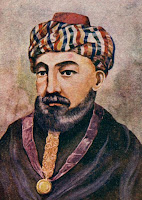At the end of Parshas Beha'aloscha (Numbers 12), we read of the incident in which Miriam is punished with tzaraas for the sin of speaking lashon hara (harmful speech) of her younger brother, Moses. (See our previous discussion of this incident.) This incident is of such significance that it is the subject of a special obligation, as stated in Deuteronomy 24:9:
זכור את אשר עשה ה' אלקיך למרים בדרך בצאתכם ממצרים:
“Remember what Hashem your God did to Miriam when you were on the road when you left Egypt.”
 |
| Maimonides |
The Torah is telling us to think deeply upon what happened to the prophetess Miriam, who spoke about her brother. For she was older than him, and she had raised him [as a child] and had endangered herself to save him from the [river], and she did not speak derogatorily of him, but simply erred in equating him to to other prophets. {Furthermore, Moses] had no objection to any of these words, as it says [in the account of the incident] (Numbers 12:3), "and the man, Moses, was very humble." And, despite all of this, she was immediately punished with tzaraas! [If even in such a case, God was so strict with regard to the sin of lashon hara, then] all the more so with regard to those foolish and wicked men who talk excessively of great and wondrous matters [i.e. they speak disparagingly of the righteous and the prophets]!Thus, we have a special obligation to remember what happened to Miriam, and from recalling that incident, we should recognize the great severity of the sin of lashon hara. Indeed, the mere fact that there is such a mitzva is itself a matter of great significance. As the Pele Yo'etz (R' Eliezer Papo, d.1824) points out (ערך זכרונות), lashon hara is the only prohibition with such an obligation associated with it.
While the severity of the sin of lashon hara is well known and is heavily emphasized throughout all traditional Torah works, the reason for this severity is less clear. On the simplest level, one of the reasons why the severity of lashon hara is so heavily emphasized is precisely because it is a sin that is often overlooked as insignificant. While we readily recognize the severity of crimes such as murder, robbery, or even simply striking another person, and we would not hesitate to condemn someone who engages in such behavior, when it comes to lashon hara our moral awareness often seems to be diminished. Thus, the Torah must go out of its way to emphasize, and reemphasize, over and over, the severity of this sin, and to stress that it truly is in the same moral category as murder and robbery.
Moreover, asides from the obvious moral issues involved in lashon hara, there are sources that tell us that the severity of lashon hara is rooted in the spiritual significance of the power of human speech. R' Levi Yitzchak of Berdichov (d.1809) writes (פי' נחמד על הזכירות) that the the human power of speech is a special gift from God that distinguishes us from the animals. The true purpose of this gift is for us to use it for spiritual purposes, especially the study of Torah and prayer. To, God forbid, take this Divine, spiritual gift and use it to speak lashon hara or falsehoods or any of the other sins involving speech, is therefore a basic corruption of our spiritual status as human beings.
No comments:
Post a Comment